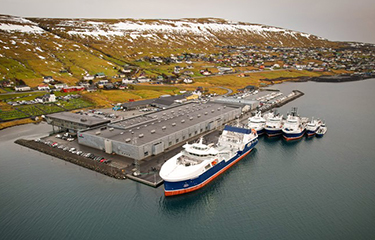Salmon farmer Bakkafrost Group said its “One Company” strategy appears to be paying off as the company posted all-time-high Q4 and full-year revenue in 2022.
Bakkafrost posted all-time-high Q4 and full-year revenues in 2022 of DKK 1.9 billion (USD 272.9 million, EUR 255 million) and DKK 7.13 billion (USD 1 billion, EUR 956.8 million) respectively. These were alongside operational earnings before interest and taxes (EBIT) of DKK 376 million (USD 54 million, EUR 50.5 million) for the quarter and a record DKK 1.7 billion (USD 244.1 million, EUR 228.1 million) for the full year.
The Faroe Islands-headquartered company saw a Q4 2022 loss of DKK 154 million (USD 22.1 million, EUR 20.7 million) versus a loss of DKK 3 million (USD 430,932, EUR 402,958) a year previously. But for the full-year, profit exceeded DKK 1.34 billion (USD 192.5 million, EUR 179.8 million), up from DKK 964 million (USD 138.5 million, EUR 129.4 million) in 2021.
Bakkafrost is the largest salmon farming company in the Faroes and the second largest in Scotland, and while there are stark differences between the biological performances of the two operations – with the Faroes reporting all-time low sea lice levels and historically low mortality in Q4 2022, and Scotland continuing to be beset by challenges, particularly in October and November – there are signs the implementation of the producer’s “One Company” strategy merging the Faroese and Scottish organizations and builds on their strengths is starting to pay off.
Delivering the latest results in Oslo, Norway, Bakkafrost CFO Høgni Dahl Jakobsen said last year’s Q4 farming conditions in Scotland followed the normal seasonal pattern, with more biological challenges compared to the first-half of the year, but he added that it’s now much better equipped to overcome these risks.
The company also introduced a new 4,000-cubic-meter wellboat in Scotland with dual treatment and freshwater capabilities. This lowered sea lice levels and reduced exceptional mortalities in the quarter, the company reported.
Overall, Scottish mortality in Q4 2022 was lower than the year before, and Jakobsen said towards the end of the year mortality reduced even more, so Bakkafrost decided to reduce its harvest – letting the fish grow and gain both weight and value. As a result, it harvested its biggest fish in January, and the company’s harvest sizes in both January and February rose above 5 kilograms compared to an average of 3.3 kilograms a year ago.
“We tap into a higher price band in Scotland with larger fish. That’s a significant improvement,” Jakobsen said.
In the Faroe Islands, the company also introduced a new 10,000-cubic-meter capacity wellboat, which Jakobsen said is one of the largest in the world. The new wellboat, dubbed Bakkafossur, also adds freshwater treatment capabilities to the Faroese operations, and according to Jakobsen will improve the biological performance and prepare the company for future offshore farming in the Faroe Islands.
With regards to the price premiums achieved, he said that Bakkafrost integrated its brands and is now selling the fish as “Bakkafrost fish” both in Scotland and in the Faroes.
“It’s fed with the same feed, we are operating more and more alike, so over time, the margins will also develop more singularly,” Jakobsen said. “We have customers that are willing to switch one for the other if we don’t have the particular size that they require – we can supply from the Faroes or vice-versa.”
Bakkafrost said it expects to further mitigate challenges in Scotland through the implementation of a large-smolt strategy. In the Faroes, its large smolt have a lower risk exposure in the marine environment due to shorter production cycles in the sea. Therefore, Bakkafrost’s has made it its top priority in Scotland to invest in its hatcheries.
Meanwhile, the company said the expansion of its Applecross hatchery is progressing well, with Applecross 4 set to be operational with 125-gram fish added to the tanks next month. As such, the first batch of large smolt delivered to its Scottish sites from Applecross 4 is planned for Q2 2023.
The full capacity of Applecross, including the next expansions, will be in operation in mid-2024, bringing the overall annual production capacity from the hatchery to around 10 million smolts of around 500 grams.
In Q4 2022, the average weight of released smolt in Scotland was 115 grams, which was 10 percent higher than a year previously.
Bakkafrost plans to build three large hatcheries in Scotland, which will increase the total annual production capacity to around 18 million smolts of around 500 grams in 2026.
According to Bakkafrost’s Q4 2022 report, the company’s …
Photo courtesy of Bakkafrost








